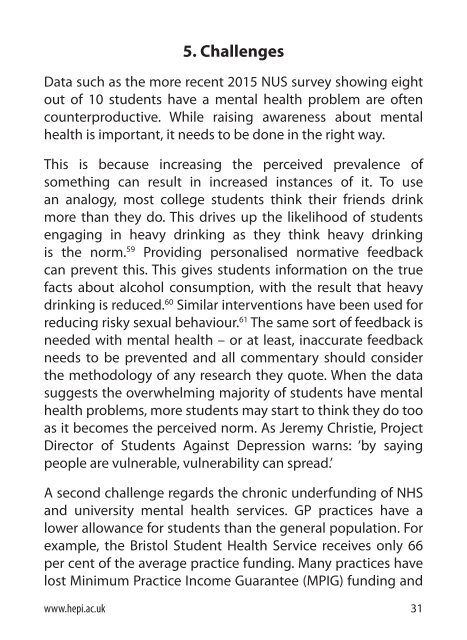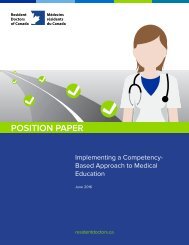The invisible problem? Improving students’ mental health
2cU9ATf
2cU9ATf
You also want an ePaper? Increase the reach of your titles
YUMPU automatically turns print PDFs into web optimized ePapers that Google loves.
5. Challenges<br />
Data such as the more recent 2015 NUS survey showing eight<br />
out of 10 students have a <strong>mental</strong> <strong>health</strong> <strong>problem</strong> are often<br />
counterproductive. While raising awareness about <strong>mental</strong><br />
<strong>health</strong> is important, it needs to be done in the right way.<br />
This is because increasing the perceived prevalence of<br />
something can result in increased instances of it. To use<br />
an analogy, most college students think their friends drink<br />
more than they do. This drives up the likelihood of students<br />
engaging in heavy drinking as they think heavy drinking<br />
is the norm. 59 Providing personalised normative feedback<br />
can prevent this. This gives students information on the true<br />
facts about alcohol consumption, with the result that heavy<br />
drinking is reduced. 60 Similar interventions have been used for<br />
reducing risky sexual behaviour. 61 <strong>The</strong> same sort of feedback is<br />
needed with <strong>mental</strong> <strong>health</strong> – or at least, inaccurate feedback<br />
needs to be prevented and all commentary should consider<br />
the methodology of any research they quote. When the data<br />
suggests the overwhelming majority of students have <strong>mental</strong><br />
<strong>health</strong> <strong>problem</strong>s, more students may start to think they do too<br />
as it becomes the perceived norm. As Jeremy Christie, Project<br />
Director of Students Against Depression warns: ‘by saying<br />
people are vulnerable, vulnerability can spread.’<br />
A second challenge regards the chronic underfunding of NHS<br />
and university <strong>mental</strong> <strong>health</strong> services. GP practices have a<br />
lower allowance for students than the general population. For<br />
example, the Bristol Student Health Service receives only 66<br />
per cent of the average practice funding. Many practices have<br />
lost Minimum Practice Income Guarantee (MPIG) funding and<br />
www.hepi.ac.uk 31





